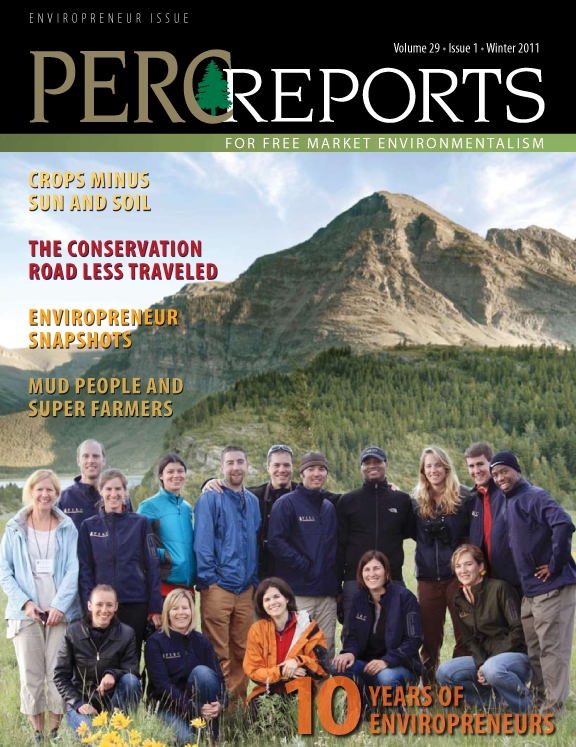By Laura E. Huggins
“Every private sector entrepreneur has this incredible bias toward letting enlightened self-interest pull things along, and I fully believe this will happen,” says Gregg Carr who is creating a national park in Mozambique. Carr is finding that the fastest way to solve most environmental problems is with “economics not public policy”—a concept that PERC’s Enviropreneur Institute (PEI) has been teaching over the past 10 years. In this year’s special enviropreneur edition, PEI director emeritus, BOBBY McCORMICK, reflects on the past and future of this powerful program.
For ERIC KIHIU, PEI class of 2010, the problem is the disappearing populations of black rhino and bongo antelope in Kenya. The economic solution: a motorsport race that attracts not only a bold batch of off-road warriors but also substantial financial resources for wildlife conservation.
Traveling west from Kenya, author G. PASCAL ZACHARY goes deep into Uganda to tell a tale of entrepreneurial villagers. One such villager, Ken Sakwa, lacks land titles but that hasn’t stopped him from creating contracts, leasing land, and building a farming enterprise. Zachary views such developments as an important journey toward property rights.
JOSH HOTTENSTEIN, CEO of Verdant Earth Technologies and PEI class of 2010, is busy transforming shipping containers into sun-free, soil-free, pesticide-free farms. For Josh it’s all about getting the most out of limited resources. With no soil, Verdant can grow a head of lettuce with one percent of the amount of water used to grow lettuce in a good old fashion field.
But as demonstrated by CORY CARMAN, class of 2008, enviropreneurs are finding ways to keep the old fashion farm alive and well. Carman’s ranch is discovering how the efficiencies of the large-scale food system, which once threatened to put many traditional family farms out of business, might be a mid-sized farmer’s best bet. The USDA refers to such farms as the “the disappearing middle.” Journalist SETH ZUCKERMAN explores agricultural easements as another path to “protect habitat for farmers.”
Turning to eco-fashion, SUMMER RAYNE OAKES, class of 2010, had her work cut out for her educating fellow enviropreneurs about fashion in Bozeman, Montana, where couture is chunky heeled hiking boots paired with a puffy down vest. Summer is co-founder and CEO of Source4Style. “When it comes to what we wear, we seldom consider how it affects the natural, cultural, and economic world around us,” she writes. Source4Style is creating an online marketplace allowing designers and brands to search and source eco-friendly materials and services from a network of global suppliers.
CHRIS CORBIN attended PEI in 2008 as a Big Sky Brewing Company marketing man with an idea for a water marketing start-up. Today, his company, Lotic LLC, has completed 30 water rights consulting projects across 18 states. Lotic’s work focuses on the confluence of economic prosperity and resource conservation, or as Chris puts it, “where blue turns into green.”
PERC has learned a great deal from the nearly 200 enviropreneurs who have visited PERC University. I hope you get a taste of their knowledge and inspiration from this fifth annual enviropreneur issue. Also, please be sure to visit PERCREPORTS.ORG to watch video footage accompanying many of the articles. To subscribe to PERC Reports, click here.



